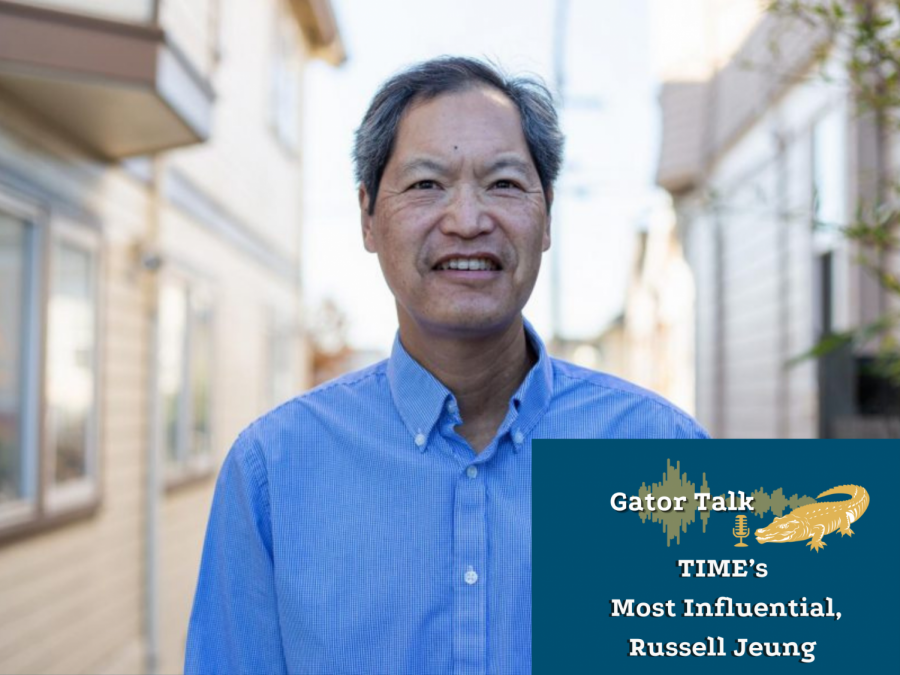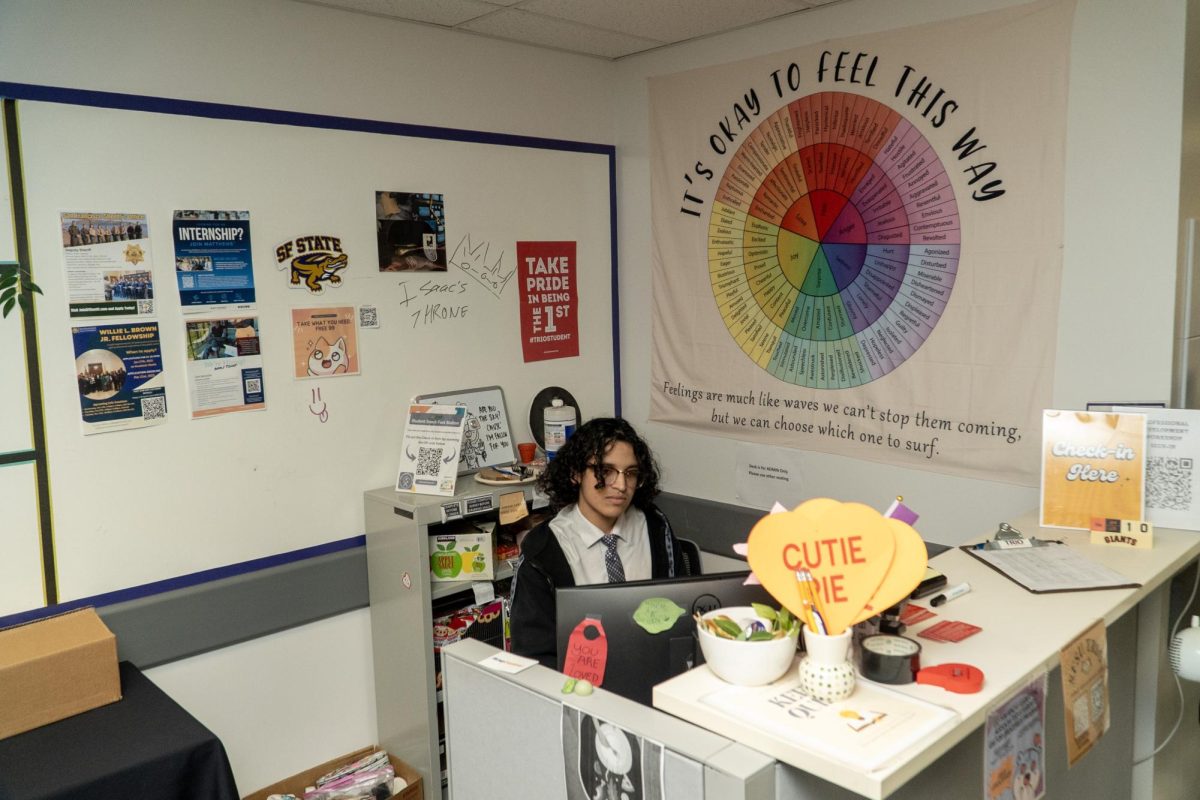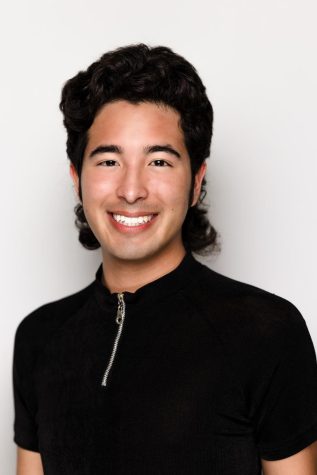Welcome to Gator Talk, a collaborative CalState podcast that brings city and statewide perspectives to SF State news.
Co-host Chris Ramirez and guest host Sabita Shrestha, photo editor, sat down with SF State professor Russell Jeung, founder of Stop AAPI Hate and recently-named one of TIME’s most influential people of 2021. Chris and Sabita asked about the reason for starting the project and how it has grown over time and with the Biden administration.
Check out the story here at Gator Talk.
Intro
Chris: Hola que tal
This is Chris Ramirez, editor-in-chief and your co-host for Gator Talk, a Golden Gate Xpress podcast that brings news to SF State students, just like you!
Ten more weeks until winter break! We’re right around the corner, so hang in there! *Sigh* …
At least it’s Halloween next month, so there’s that?
Anyway, you ready?
For more information/coverage, check out goldengatexpress.org OR @GatorTalkPod on all social media platforms.
Preview of the show
Chris: Here’s a run-down of today’s episode.
First, I’ll give a news brief with things that happened this week that matter to you, a member of the campus community.
Xpress photo editor, Sabita Shrestha, joins us for the main story. We’re going to breakdown down her interview with the former chair of Asian American Studies and founder of Stop AAPI Hate, Russell Jeung.
Here’s the brief.
News brief
San Francisco’s Lowrider Council celebrated its 40th anniversary on Sunday with a showcase of vehicles on Mission and 24th streets, right outside the Mission Cultural Center for Latino Arts. The center is currently holding an exhibit on lowriding culture until Monday, so feel free to check it out. Xpress also covered this, and I shot a video for it! Feel free to check it out for more info.
SFO became the first airport in the nation to require vaccination for all of its on-site workers on Tuesday. While San Francisco has already required city workers to get vaccinated or become subject to weekly testing, many airport workers are hired through private outside companies. Employers that work through SFO must also submit reports on employee vaccination status until all are vaccinated — they run the risk of being fined if they fail to do so.
On Wednesday, the Food and Drug Administration formally signed off on Pfizer booster shots, but only for those 65 and older, as well as those who are immunocompromised. The CDC supported this on Thursday. Those eligible may receive their booster shot six months after their second shot.
Main Story
Sabita: Hi everyone, my name is Sabita Shrestha, I am the photo editor at Xpress.
This week, I had a chance to talk to SF State professor Russell Jeung. In 2020, he collaborated with Chinese for Affirmative Action and Asian Pacific Policy Planning Council to launch Stop AAPI Hate, which has been tracking the incidents of hate and discrimination against Asian Americans and Pacific Islanders. Last Wednesday, Professor Jeung and his co-collaborators received recognition for the project by being named one of TIME Magazine’s 100 most influential people of the year.
[interview audio]
Jeung: The recognition from Time 100 means that we’ve helped start a movement that’s making change. And it’s not an individual award, but an award for the entire community that has stood up to racism and made our voices heard.
[interview audio ends]
Chris: And to make sure I’m getting it right, he grew up in San Francisco, right? Can you tell me about his childhood and maybe some of the things he experienced that helped shape his world view?
Sabita: Yes, so he grew up in the Richmond District, which back then was primarily white. In the 1970s, 70% of SF’s population was white, according to the Bay Area Census. In 1980, the white population declined to 59% but that was still the majority.
His dad grew up and worked in San Francisco Chinatown and his mom in LA. He said that he faced tons of racism back then and his parents faced even a lot more during their time.
Chris: And so, how has it shaped the work that he does now?
Sabita: Professor Jeung has been involved in social activism on racism for decades and has published multiple books about Asian Americans. He said that growing up, he often visited Chinatown and it really shaped his perspective in seeing how difficult it was for immigrants to make a living and to succeed in the society.
The Immigration and Nationality Act of 1965, which abolished this immigration based on race and ethnicity and gave rise to large-scale immigration, brought new waves of immigrants in San Francisco in the 60s and the 70s, mostly Chinese from Hong Kong. But they were forced to take low-paying jobs due to limited English, and those jobs were mainly in Chinatown because of the higher number of Chinese population compared to other parts of the city. Even now, 81% of Chinatown’s population is Asian according to the San Francisco Planning Department. According to the census report, the median household income of San Francisco is $112,000, but the median income of Chinatown is $26,000.
Chris: I remember in our past coverage of Stop AAPI Hate that Jeung actually said he’s also experienced a hate incident. What’s it like for Jeung working on something that has affected him personally?
Sabita: Well, he said that …
[interview audio]
Jeung: What bothers me the most are the attacks on the elderly, that’s too close for comfort. That, to me, is so egregious and wrong. It feels to me to make a difference and to really work for the safety of our seniors in our community. So I am not so much concerned about myself, or even my family but I’m really upset about how our elders are being treated. Because I see my mom, who’s 94 years old, and the elders are being attacked, and it’s vicarious trauma, seeing seniors being pushed and shoved or spat upon.
[interview audio ends]
Chris: So, fast forwarding to 2020, what was the moment when he decided to take action and create the organization, Stop AAPI Hate? When did he realize this was bigger than just himself, that it was a national trend he needed to call out and address?
Sabita: He was actually on an airplane flight when he realized this.
[interview audio]
Jeung: I recall reviewing data of news accounts on racism. And the numbers were significant enough to contact Asian American civil rights groups. So I think that’s when I saw the data on a flight, on an airplane flight, and recognized the clear trend that led me to cause the other organizations to start Stop AAPI Hate. I knew I just- I couldn’t just issue a report on my own, but it would be more powerful coming from civil rights organizations, or in partnership with civil rights groups. So that’s how we establish Stop AAPI [Hate], to use the data to partner with the community to make change.
[interview audio ends]
Sabita: For the context, this was around the first two months of 2020. Back then, the first case of COVID-19 was reported in the U.S., and former president Trump addressed it as “China Virus” or “Wuhan Virus.” That’s when anti-Asian racism and xenophobia started to surge.
And it’s only gotten worse since then — the number of incidents reported hit a peak of 1,135 in 2 weeks back in March 2020, which was also the first report from Stop AAPI Hate. And these events are still happening today. According to the latest report, the number of incidents has reached just over 9,000.
– Chris: We’re gonna take a quick break –
Break
Support the Golden Gate Xpress’ work by signing up for our online newsletter, following us on Instagram or Twitter @ GGXnews and visiting the website: https://goldengatexpress.org
Interested in advertising with GGX? Check out our advertising page on goldengatexpress.org/advertising.
– break ends –
Cont. Main Story
Chris: And we’re back. So Sabita, aside from tracking hate incidents, how else does Stop AAPI Hate provide for Asian Americans and Pacific Islanders who have been on the receiving end of these hate incidents? My sense is that experiencing something like this could be not just physically damaging, but also traumatic and emotionally damaging.
Sabita: They’ve actually partnered with groups like the Asian American Psychological Association, Asian American Psychiatric Association and Mass General Hospital to get information and resources out. They don’t provide those services, but Jeung said that they’re looking into providing them.
Through this collaboration and research, they published a mental health report at the end of May. The findings were that Asian Americans who have experienced racism are more stressed by anti-Asian hate than the pandemic itself and one in five of those victims display racial trauma, and they also have heightened symptoms of anxiety, depression and stress. This report alone could help provide resources to the victims because they issue the reports with mental health groups.
Chris: I’m realizing that Stop AAPI Hate is largely a community effort, both among its creators and in how people self-report these hate incidents. On that note, what did Jeung say about the purpose of having it be community-centered?
Sabita: So, Professor Jeung teaches ethnic studies, and he believes that the organization’s mission is to partner with the broader racial community and to work in solidarity with people of color and learn from the communities and provide solutions through their stories. In an interview with SF State news, he actually referenced the legacy of the Third World Liberation Front strikers, who brought about the creation of the College of Ethnic Studies and the Black Student Union, both the first of their kind in the nation.
[interview audio]
Jeung: Partnering with two other community based organizations, is part of our legacy and ethnic studies, and the way one of my methodologies and doing sociology by learning from the community. And by amplifying the voices of the community, I think that’s also a good way to do public policy, because we understand the issues we’re facing and we can come up with the best solutions for them. One example is that I see a lot of the racism is directed at Asian Americans, because we’re perceived as foreigners who don’t belong. And in the reports we’re receiving, people are told time and time again “Go back to China you in …..” So having their stories sort of provides evidence of this perpetual foreigner stereotyping.
[interview audio ends]
Chris: I know that we spoke with professor Jeung for a story right around the Lunar New Year, so I’m curious: what’s changed for the project since then?
[interview audio]
Jeung: So after February, we have the Atlanta shootings and the Indianapolis shootings. And they were devastating. They really highlighted the issue for the nation, about the racism against Asians and Stop AAPI hate received a lot more attention and got a lot more resources. So as a result, the number of reports continued to surge. And because people heard about us and knew about us, and we’re more likely to report. So now we’ve gained more prominence. I think the movement of Stop AAPI Hate really grew after the Atlanta shootings. And we’ve been able to have more voice and more of a platform because of the attention the issue was receiving. So it’s been actually more heartbreaking and sad, since February because we’ve had the shootings and that trauma, that grieving.
Sabita: And how has the Biden administration impacted the work being done through Stop AAPI Hate? Has more action been taken?
Jeung: I think his administration has continued to be proactive in addressing the issue. We’ve met with different agencies and departments. And they’ve taken a lot of concrete steps to address the issue, we want him to continue to redouble his efforts to put more money into the issue. But I think they have been much more proactive and supportive than the previous administration.
[interview audio ends]
Chris: That’s right — I remember back in the very early days of the Biden administration, after Biden signed an executive memorandum condemning the hate incidents against Asian Americans and Pacific Islanders. Professor Jeung told me then that the Trump administration’s rhetoric and anti-immigration policies actually fueled the fire that kinda kickstarted where we are today with these hate incidents.
Part of Stop AAPI’s origins lay in the fact that they knew that former President Trump wouldn’t push the federal government to collect this data. And, so, it sounds like the Biden administration has taken a step in the right direction as far as holding conversations with Jeung and his team, but how can it do more?
Sabita: He said that the Biden administration could put more funding into the issue to provide resources for victims and mental health services and expand their civil rights protections and suspend the China Initiative.
Chris: What’s the China Initiative?
[interview audio]
Jeung: The China Initiative is a project in the Justice Department that actually racially profiled Chinese researchers. And they’ve been surveilling and investigating Chinese researchers just because of their ethnicity. And it’s chilling, and it’s a violation of our civil rights, they haven’t really found any national security threats. But the harm it’s done to the individuals by violating their rights, it’s been powerful. So we want him to suspend that particular policy.
[interview audio ends]
Chris: Sabita, you mentioned to me earlier that he’s not teaching this semester, right? Can you tell me how Stop AAPI Hate ties into his sabbatical research?
Sabita: He’s actually committing to Stop AAPI Hate full-time, as his research. They are producing three reports this fall; one on youth, one on elderly and one about going back to work. So this has allowed him to do a lot of research first and is trying to identify promising practices to address the issue. He will be back in spring to teach classes, but will continue his work on Stop AAPI Hate.
Chris: Last question: What’s next for Stop AAPI Hate?
[interview audio]
Jeung: We’re going to continue to pursue initiatives to fight racism. We want to promote ethnic studies, again, we want to expand our civil rights protections, and we want to improve community safety. So we’re going to continue to focus on those areas. for the long haul, you know, the roots of racism are deep. And so we really have to have a concentrated effort to uproot those sources of racism.
[interview audio ends]
Chris: Thanks so much for joining me today, Sabita.
Sabita: Thanks for having me.
End
And that was the episode.
This is Chris Ramirez, editor-in-chief and your co-host for Gator Talk.
New episodes will premiere Friday mornings, so stay tuned.
And with that, I’m out.
















